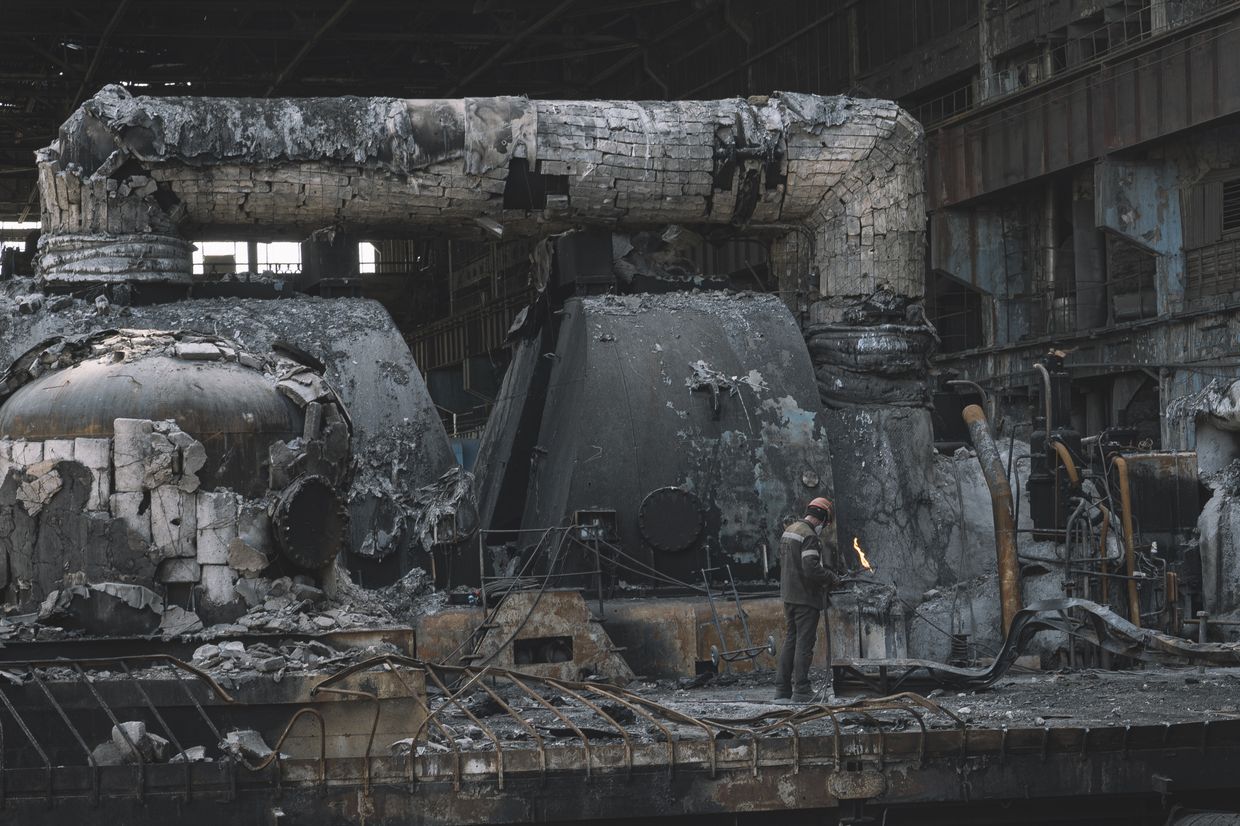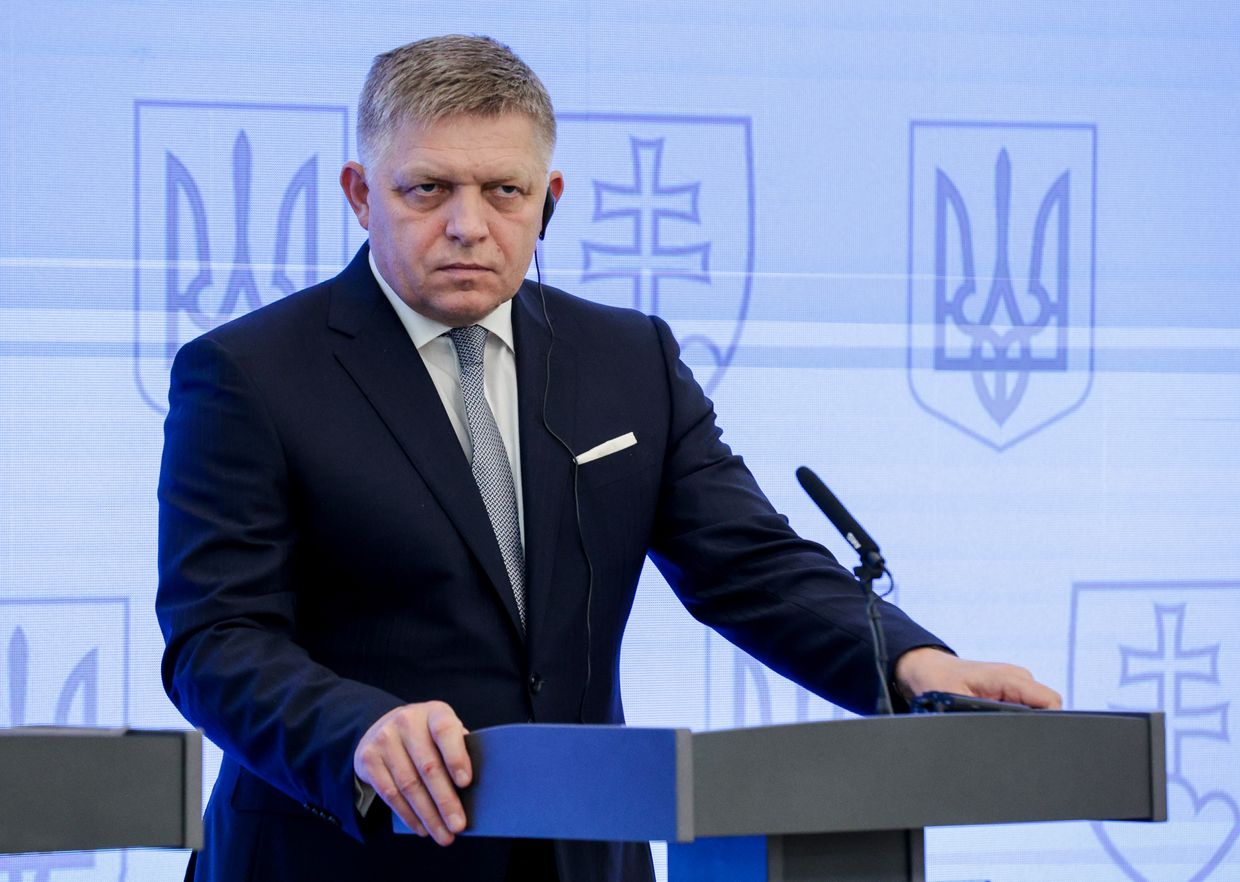Ukraine Business Roundup — Business goes to war with proposed tax hike.
Support independent journalism in Ukraine. Join us in this fight.
Become a member Support us just onceBusiness and government in Ukraine are publicly slamming one another over a proposed tax hike Kyiv says is necessary to fund its fight against Russia. Earlier on July 18, the Finance Ministry announced that the government had approved draft changes to the 2024 budget law that included an increase in defense spending by Hr 500 billion (£12 billion). The government wants to partly fund its plans with an increase in taxes and other duties, including war taxes on individuals and businesses as well as additional levies on imports and higher excise duties.
The plan is to raise around £3.3 billion from the increased taxes by the end of the year. While the government has said it has chosen the "softest" option for financing its military needs, major business associations and businesspeople have publicly opposed the proposed changes. Businesses say that any additional taxes will only put more pressure on already struggling tax-paying businesses and will push more business activity into the shadow economy.
They have called on the government to crack down on illicit business before going after honest taxpayers. The American Chamber of Commerce (AmCham) in Ukraine said in a statement that the proposed tax hike discriminates against "bonafide transparent taxpayers" and encourages tax evasion, calling on the government to avoid implementing the change. Oleh Horokhovsky, CEO of the popular Ukrainian bank Monobank, wrote on his Facebook page that "anyone who comes to you with a proposal to raise taxes in a warring country is a traitor."
When asked how funds have been raised during previous wars, Horokhovsky wrote that "those who steal and loot during the war were shot." Chairman of the Committee on Financial, Tax and Customs Policy of the Verkhovna Rada, Danylo Hetmantsev said that while the government's proposal isn't ideal, it's necessary to cover the deficit. "(The proposed law) needs significant revision.
However, the raising of individual taxes to cover the deficit in financing military expenditures, unfortunately, cannot be avoided," he said in a post on Telegram. Lawmakers are expected to introduce their own version of the law in the coming weeks. Read the full article here.
 Ukrainian M&A deal value by sector in the first half of 2024. (KPMG Ukraine/Lisa Kukharska/The Kyiv Independent)
Ukrainian M&A deal value by sector in the first half of 2024. (KPMG Ukraine/Lisa Kukharska/The Kyiv Independent)
Mergers & acquisitions up
Investors have mostly stayed away from Ukraine since the start of the full-scale invasion, but the tides are turning, according to a new report from KPMG Ukraine, an accounting organization based in Kyiv.
How much we talking? The first half of 2024 saw 25 mergers and acquisitions (M&As) bringing in £510 million, up from 24 M&As worth £390 million in the first half of last year. Deals are raking in much more cash this year as the average value jumped from £28 million in the first six months of 2023 to £43 million for the same period of 2024, KMPG said. In one case, French investment firm NJJ Capital purchased Ukrainian Internet provider "Datagroup-Volia" for £120 million.
The largest transaction of the first half of 2024 was IT firm Creatio's £200 million funding round. More deals can be expected throughout the year, KPMG believes, as Ukraine's economy gradually recovers from a sharp drop of 29% in gross domestic product at the start of the full-scale war. Continued energy blackouts and £20 billion in outstanding debt to international bondholders are still roadblocks in the way of further investment, however.
Read more here.
 Workers clear the rubble at a thermal power plant, extensively damaged after a Russian missile strike, at an undisclosed location, in Ukraine, on April 12, 2024. (Andrew Kravchenko/Bloomberg via Getty Images)
Workers clear the rubble at a thermal power plant, extensively damaged after a Russian missile strike, at an undisclosed location, in Ukraine, on April 12, 2024. (Andrew Kravchenko/Bloomberg via Getty Images)
Storm weathered
After a "very difficult couple of weeks" due to record-breaking heat and power plants being under repair, Ukraine's energy supply situation is improving, Volodymyr Kudrytskyi, the head of state grid operator Ukrenergo, said on July 26. "We have every reason to expect that the most difficult period of the summer is behind us," Kudrytskyi said at a briefing. That's really good news after Ukraine had to implement rolling blackouts due to Russia's spring campaign of strikes against the country's energy infrastructure.
Then came a heat wave in July that pushed electricity consumption to maximum levels, worsening the situation. Cooler weather has led to a fall in energy consumption, while certain power plants have completed their repairs. Kudrytskyi said there would be fewer scheduled blackouts and that the situation would continue to improve "if there were no new large-scale damages to power plants."
 Slovak Prime Minister Robert Fico during governmental consultations with the Ukrainian delegation in Michalovce, Slovakia, on April 11, 2024 (Sergii Kharchenko/NurPhoto via Getty Images)
Slovak Prime Minister Robert Fico during governmental consultations with the Ukrainian delegation in Michalovce, Slovakia, on April 11, 2024 (Sergii Kharchenko/NurPhoto via Getty Images)
Slovakia threatens Ukraine over Lukoil
In the latest episode of the Lukoil battle, Slovak Prime Minister Robert Fico has threatened to cut off diesel supplies to Ukraine -- which cover a tenth of the country's consumption -- if Kyiv does not resume the transit of pipeline oil from Russia's Lukoil company to Central Europe.
Here's the thing. At the start of the full-scale invasion, the EU imposed an embargo on Russian oil imports but exempted pipeline supplies, like those going through Ukraine to Hungary, Slovakia, and the Czech Republic via the Druzhba pipeline. The idea was to give these countries time to find alternative supplies.
But instead of shunning Russian oil like everyone else, Hungary and Slovakia kept chugging along and are now complaining about Kyiv's new sanctions blocking the transit of Russia's Lukoil to Central Europe. "Many EU members took costly but necessary efforts to get rid of dependence on Russian gas and oil ... mainly because it stinks of blood," one EU diplomat who spoke on condition of anonymity told Politico. Kyiv on July 30 said it was open to participating in consultations with the European Union on the transit of Russian Lukoil's oil, according to Foreign Ministry spokesperson Heorhii Tykhyi.
 Esper Bionics hand demonstration. (Esper Bionics Press service)
Esper Bionics hand demonstration. (Esper Bionics Press service)
Ukrainian startup makes cyborgs a reality
Outmanned and outgunned, Ukrainian soldiers in 2014-2015 held Donetsk Airport from attacking Russian-backed forces for more than 240 days before retreating from the destroyed structure.
They became known in Ukraine as "cyborgs" for their apparent near super-human defense. Ten years later, the myth has become reality. Esper Bionics, a U.S.-Ukraine startup, produces a robotic prosthetic currently being used by over 30 Ukrainian soldiers serving in Russia's war.
Another 80 veterans in Ukraine have also received an Esper bionic arm. "A lot of soldiers who receive our hand feel like cyborgs," says Esper Bionics Chief-of-Marketing Dmytro Ganush. "They want this cyberpunk feeling. They want to be like (a character in the movie) Ex Machina."
Esper Bionics never set out to provide bionic prosthetic hands that would help get soldiers back into combat, or even to focus on the Ukrainian market. Russia's full-blown invasion in February 2022 has left thousands of Ukrainians without limbs, changing the company's priorities. Esper's research and development, assembly, and production are all now entirely based in Ukraine, where it provides the lion's share of its robotic hands.
Read the full profile here.
What else is happening
Ukraine signs two contracts with domestic defense industry worth £121 million, Umerov says
In a post on Facebook, Umerov described the two deals as "critically important" for the Armed Forces of Ukraine. "Our defense industry is getting stronger," he said, adding: "As we buy and support our own, contributing to the development of our economy and industry." Umerov signed the deals while on a trip to Kharkiv and Poltava oblasts with President Volodymyr Zelensky on July 29.
Ukraine's Naftogaz puts new high-rate gas well into operation
Ukrgasvydobuvannya, Ukraine's largest gas producer and part of the state Naftogaz Group, put into operation a high-rate well that produces 274,000 cubic meters of gas per day, Naftogaz Group reported on July 30. "The commissioning of the new well increased the daily production of natural gas at the deposit by 17%," Naftogaz Group CEO Oleksii Chernyshov said.
Ukraine needs to increase nuclear power capacity to overcome problems with electricity generation, US official says
U.S. special representative for Ukraine's Economic Recovery Penny Pritzker said during a recent visit to Kyiv that building up nuclear power is a rational quick solution to deal with the energy crisis brought on by Russia's war.
In April, Energoatom started building reactor units 5 and 6 at the Khmelnytskyi Nuclear Power Plant using U.S. technology that would help prevent power outages in case of further Russian attacks.
G7 to finalize plan by October on £50 billion loan for Ukraine backed by Russian assets revenue
The Group of Seven (G7) will likely finalize a framework agreement for a £50 billion loan for Ukraine backed by frozen Russian assets revenue by October, EU Economic Commissioner Paolo Gentiloni said on July 25.
Reuters reported that a G7 source had described the discussion on the plan as "detailed and positive," and that there was "shared optimism that all remaining questions can be resolved."
Ukraine ends run of 3 interest rate cuts as inflation accelerates
Ukraine's Central Bank ended a string of three interest rate cuts, holding the key rate at 13% last week after price growth sped up in June to its highest level since December. "The baseline scenario of the forecast assumes that the National Bank of Ukraine will only return to a key policy rate easing cycle in early 2025," the bank said.
Subscribe to the Newsletter
Ukraine Business Roundup
Subscribe